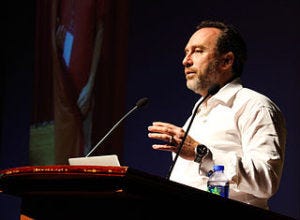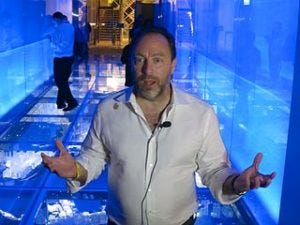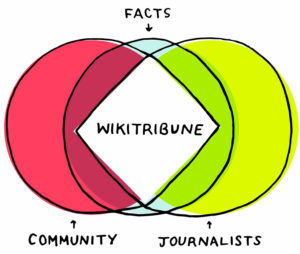Does WikiTribune Even Stand a Chance?
Almost four years ago, Jimmy Wales stood before an audience of Wikipedians at the 2013 Wikimania conference in Hong Kong, delivering his annual keynote address. Mere weeks had passed since former NSA contractor Edward Snowden had become famous (or infamous) for releasing sensitive U.S. government documents and escaping to a hotel room just blocks away from the site of the conference. Given Wales' status as the spokesperson for a movement based on free information, and the coincidence of shared location((Snowden's hotel was in Tsim Sha Tsui, the Wikimania conference next door in Hung Hom)), media coverage at the time largely focused on his remarks about Snowden.
But Wales had another topic in mind, inspired in part by then-current events, which media outlets mostly mentioned only in passing. Here, too. This is what The Wikipedian had to say, based on having witnessed the speech at the time:
Wales called for a new “hybrid model” of journalism, encouraging collaboration between professionals and amateurs. It sounds interesting, maybe, but he didn’t have an actual model in mind: he called on the Wikipedia and Wikimedia community to help him think it up. I guess we’ll see. Some raised the question of what will contributors to the Wikimedia Foundation’s Wikinews project think of it, but the question kind of answers itself: Wikinews has never been a success, and is kept alive only by a few die-hards. ... So maybe this will become that. Or maybe we’ll never hear about it again.
Credit where it's due: although Wales had said nothing more about it publicly in the years since, and "Jimmy's hybrid model" had become at best the source of an occasional snicker among Wikipedians skeptical of Wales' follow-through (about which more later) now there is no question he really meant it. On April 24, Wales announced the creation of an ambitious newsgathering and reporting project called Wikitribune with the debut of a placeholder website, promotional video, crowdfunding campaign, and launch coverage led by NiemanLab.

Most of what's been written so far has been positive, thanks to goodwill surrounding the Wikipedia project, and by extension to Wales, its credited founder. Following the lead from his intro video, a fair bit of Wikitribune coverage is centered on its stated goal of fighting fake news. Despite the term's dilution and partial co-optation by President Trump, it remains the media evil du jour—Washington Post executive editor Marty Baron recently called it "the greatest challenge we face in the industry at the moment". The notion that Wikipedia is the remedy is one everyone is happy to play along with, though it's more hypothesis than established fact.
The most critical perspective so far comes from Adrienne LaFrance at The Atlantic, questioning the volunteer-professional hybrid collaborative concept, i.e. that one "who is paid for doing journalistic work cannot be considered 'equals' with someone who is unpaid" and that it devalues the work of professionals to assume it can be done by volunteers. It's partly a critique of the model, and partly a critique of the morality; it's an important criticism, and one that should be taken seriously.((I do think these questions also have good answers, and it matters very much how the roles of each party are defined. There is a similarly important distinction to be made in managing paid vs. volunteer contributors to Wikipedia, although I suspect the best arrangement in each case are roughly opposite. A topic for exploration another time.)) Another cautious note was sounded by Mathew Ingram at Fortune, listing failed previous attempts to launch crowdsourced news sites.((Spot.us, Beacon Reader, Contributoria, and Grasswire, none of which I had previously heard of.))
♦ ♦ ♦
In Wikipedia circles, there is considerable skepticism, and for entirely different reasons.

The first is that Wikipedia has tried this before, as briefly noted in my excerpt above: Wikinews launched in 2004, when Wikipedia was growing rapidly and adding new sister projects. But it never reached critical consensus, and few contributors ever produced meaningful original content for the site. These days, Wikinews has only a handful of active users. And it's not hard to see why: Wikipedia already compiles digests of news coverage, and Google points readers to Wikipedia, so Wikinews is at best an afterthought. But it's worse than that. Compare the Wikipedia article "Dismissal of James Comey" to the Wikinews article "President Trump fires FBI Director James Comey, raising questions about Russia investigation" and the problem is apparent. The Wikipedia entry does something that no other website on the internet does: it serves as a one-stop aggregator of everything important in the ongoing political crisis, first with a high-level but substantial summary in the introduction, and then a deep dive into the particulars. The Wikinews article is a rehash of a few other previously published stories from traditional news outlets, offering no new reporting, ending at less than 700 words, and on a fixed date, like an Associated Press wire story might because of real constraints on the AP that Wikinews imposes on itself arbitrarily. Wikinews offers nothing new, is less good than what it imitates, and frankly has no reason to exist. Also, the Wikinews article has four sources; the Wikipedia article has 114. Case closed. And yet past attempts to close Wikinews have been resisted, both by a handful of dead-enders, and by Wikipedians who hold out hope for a future renaissance. Its biggest impact in 2017 is that its continued existence requires Wales to call his new thing "Wikitribune" rather than the more straightforward name on which it's unproductively squatting.

The second reason, and I don't mean to dwell too much here, is that there are good reasons to think that Jimmy Wales is not the right person to lead such a project, save for his internet celebrity as the online collaboration guy. Wales struck gold with Wikipedia—although not actual money, as a cheekily titled NYT Magazine profile once reminded everyone—and he hasn't repeated the trick since. His next most successful venture is Wikia, a collection of wikis on entertainment topics, the best known of them probably being Wookiepedia but also including communities for fans of music, TV, movies, video games, comics, and other geek subcultures. It does rank in the top 100 websites, and it's more than 10 years old, so it's a legitimate business—and it's also monetized with advertising, the one thing Wikipedia can never ever do. Wikia is fun and useful to fans of pop culture, but it's hardly a world-beater. Other Wales enterprises have fizzled or faded: Wikia Search was a bust, and a MVNO called The People's Operator((It is worth noting that the aforelinked Wikipedia article about Wales' MVNO is highly negative.)) is heading that direction. Yet almost no one outside of the Wikipedia world is familiar with any of this; Ben Thompson, one of the smartest analysts writing about technology and media, recently wrote: "I don't know if Wikitribune will work — but Jimmy Wales is one of the last people I would want to bet against."
♦ ♦ ♦
But let's talk about Wikitribune and its actual prospects. This is not easy, as many specifics about its plans have yet to be clarified; at the time this is written, Wikitribune had announced but a single hire and, with no disrespect intended, it wasn't someone with a high-profile name or big reputation. Although analysis of Wales' actual plans may be premature, it's not too soon to assess its stated direction and speculate about what might actually work for it.
I will switch gears here for a moment and agree that Wales has identified a real problem that needs to be solved: he is correct to say that the news industry is in big trouble—“broken", even. The internet has dealt a nearly lethal blow by creating effectively free distribution, both upending its advertising-based business model and subjecting it to competition from low-quality but highly engaging clickbait infotainment.((Facebook, of course, figures prominently in both.))
He's wrong, though, to say as he does in the video that "we've figured out how to fix it". As Ingram documents, others have tried and failed. And there's no reason to think that, just because Jimmy Wales is the wiki guy, his association with the project is going to be sufficient for it to reach critical mass. No, if Wikitribune is going to have even a chance of success, it needs to figure out where its comparative advantage lies, and design its plans accordingly.

The Wikipedian posits that Wikitribune must absolutely learn the lesson of Wikinews: that loosely organized, come-and-go-as-you-please, volunteer-based networks are no way to develop in-depth, sustained news reporting of the investigative or beat varieties that are the principal job of national and international news organizations. To the extent that it succeeds in these areas, it must develop tight-knit reporting teams, who will be professionals, and largely based in London((where Wales resides and Wiktribune will presumably be headquartered)), New York, and Washington. The role that volunteers will play here would be very similar to the one already played by volunteers at traditional news outlets, where they go by a different name: sources.
But Wikitribune has no advantage over traditional news organizations in this kind of reporting. While the news industry overall is doing poorly, some major publications like The New York Times have seen subscriptions soar as their value has become clearer to readers following the U.S. presidential election, The Washington Post is buoyed by soon-to-be-world's-richest-man Jeff Bezos, and financial publications like the Wall Street Journal and The Economist serve affluent audiences with need-to-know information.((Like so much else in the new new economy, it is the middle class that has been thinned out: mid-tier newspapers, weekly newsmagazines, and their undifferentiated news sites that look more and more like blogs every day.)) So the opportunity to have a positive impact here is not clear, either.
The Wikipedian will therefore posit that Wikitribune's best chance to succeed is in fact in local news.
♦ ♦ ♦
As for opportunity, no one else has yet cracked the code: in news circles, the term for this is "hyperlocal", and it hasn't worked all that well, nor has it ever really ever been "news"—Patch Media, founded by AOL CEO Tim Armstrong, is technically still around but has zero impact on anything; NextDoor sounded promising when I first signed up for it, but in practice is just another place to ask about lost cats and free furniture; Backfence was a similar site that, now that I search the web for information about it, apparently never got very far. Somewhat better are local subreddits, like /r/Portland, focused on what's happening in a given city, but the content is usually centered on photos and gossip and links to local news stories.
Thompson, quoted above offering his shrugging support for Wales' initiative, has written a lot about local news in recent months, and likes to quote from a Warren Buffet shareholder letter about how local newspapers once enjoyed unique business advantages: its customers couldn't do without it, and couldn't satisfactorily replace it.((As a reminder of just how prescient Buffet can be, this letter was written in 1991.)) The problem for local news publications is that the internet has kicked its advertising base out from under it, beginning with classified ads in print newspapers and later extending to the problems of infinite supply of web advertising devaluing the ad unit, not to mention the challenges of attracting audiences big enough or targeted enough to be worth selling ads to. Earlier this week, Thompson wrote a long piece assessing the prospects of local news, arguing that local news publications would need to be subscription-based, rather than advertising-based, to succeed.
He's right about advertising, for sure. But why should it even be subscription-based? Wikipedia succeeds with donations, in some years generated by putting Jimmy Wales' own face at the top of every page, and in 2017 Wikipedia has more money than it knows what to do with. This is one way Wales' celebrity could have a positive impact. The subscriptions could be donations, which might have the added benefit of generating investment beyond cash—even creating passionate user-contributors.

Wikipedia has succeeded at harnessing passions in a way few other sites have, building miniature newsgathering communities around subjects like major weather events, geography and places, physics and astronomy, transportation and infrastructure, major sports leagues, etc. All are limited spheres of interest that more readily map onto a city or region than matters of national politics and international diplomacy, trade policy, or ongoing military conflicts.
The primary difference is that Wikipedia's content guidelines explicitly disallows editors from doing original reporting, which is just as well, because almost no likely editors have such access to federal government officials or multinational business leaders, nor is there any effective mechanism to vet them in a distributed volunteer system. However, with a professional editor at the center of the operation—as Wikitribune seems like it might—well, that could actually work.
Such a project would benefit at scale the same way Wikipedia does, not in developing one large ecosystem of researchers, writers and editors collaborating on a medium-sized number of topics, but multitudes of ecosystems working in parallel across many, many topics. And the benefit to readers is obvious: the experience reading of Wikipedia pages on familiar topics in the past prepares one to navigate Wikipedia pages on less-understood subjects in the future. Likewise, reading Wikitribune Peoria could prepare one to read Wiktribune Palermo. Consistency not just of branding but of style—a style native to Wikitribune, not to existing wire services as Wikinews does—could be useful to readers and a valuable differentiator for Wikitribune itself.
What's more, Wikitribune has an opportunity to try new things that the entrenched Wikipedia community hasn't been able to bring itself to do. For example: implement a discussion system that was designed less than fifteen years ago. The Flow project, which once sought to overhaul Wikipedia's outdated and clunky talk page format, was eventually abandoned due to resistance from veteran editors averse to change. Flow wasn't perfect, but there wasn't even political will to work through the rough patches. Wikitribune would be wise to resurrect it, and perhaps show Wikipedia how it could actually benefit the original project.

And there's another thing: Wales certainly has proved successful at creating new structures based on the Wikipedia model but tweaking the rules in order to incentivize different activities for communities with different expectations. Wikipedians didn't want advertising supporting their educational mission, but Wikians((if that's a word?)) don't mind advertising supporting their entertainment mission. It's no accident that "Wikia" is Wikipedia without the "ped"((as in learning and knowledge)). Revisiting Wales' post-Wikipedia career again, it is when he has strayed too far from his Wikipedia roots that he's got into trouble. Wikis turned out not to be the way to build a search engine, and some lofty rhetoric about transparency aside, Wales had no background in mobile telephony that would make him suited to lead an MVNO. So while there are reasons to be cautious, the more like Wikipedia his subsequent projects are, the better their outlook.
Wikipedia succeeds without a profit motive, and local news is unprofitable now. By following the same model, Wikitribune has an opportunity to benefit from Wikipedia's non-business model, and adapt its methods from pure aggregation to a hybrid of reporting and aggregation. But it's vital that Wikitribune not try to compete with the Times of London or New York. Its real, and possibly only, chance for success lies in reinvigorating a diminished local news industry. I hope Jimmy Wales takes it.
All images via Wikipedia, copyright of their respective holders.


